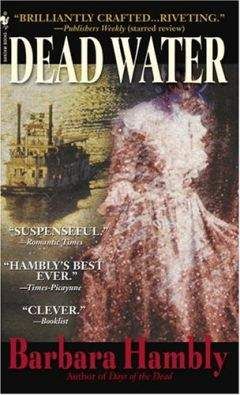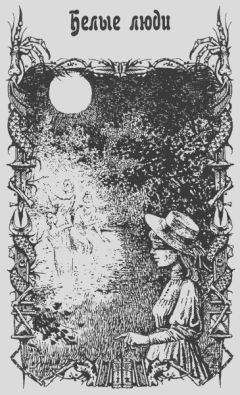Barbara Hambly - Dead water
На сайте mybooks.club вы можете бесплатно читать книги онлайн без регистрации, включая Barbara Hambly - Dead water. Жанр: Прочее издательство неизвестно,. Доступна полная версия книги с кратким содержанием для предварительного ознакомления, аннотацией (предисловием), рецензиями от других читателей и их экспертным мнением.
Кроме того, на сайте mybooks.club вы найдете множество новинок, которые стоит прочитать.

Barbara Hambly - Dead water краткое содержание
Dead water читать онлайн бесплатно
Sophie's beautiful eyes widened and her lips parted with understanding and shock, and she glanced automatically to her left, the direction in which Miss Skippen's stateroom lay. Rose, taking her cue, produced a perfectly-judged little gasp and breathed, “Miss Skippen?”
January raised his eyebrows: like Hamlet's friends, We could an if we would, and, If we list to speak . . .
Rose prompted, “But surely Julie was with her?”
“Not after we ran onto the bar,” answered Sophie. “And Miss Skippen didn't undress as Mrs. Fischer did—Julie told me. In fact, she said Miss Skippen . . .”
At the forward end of the promenade Thucydides appeared, carrying a tray of lemonade. As he passed January and Rose in Mrs. Fischer's stateroom doorway, he said quietly, “Mrs. Fischer's coming,” then walked on by without breaking stride. January and Rose followed him immediately, without even a word to Sophie, who for her part instantly bowed her head over her sewing so that she would be stitching away industriously when her mistress rounded the corner.
It wasn't until dinnertime that January heard what Miss Skippen had done on the night of Weems's death. He spent the twilight hour with Rose, huddled next to the galley passway beside a makeshift smudge of lemongrass and gun-powder that Eli had rigged to give some relief from the mosquitoes that swarmed in the dead water under Hitchins' Point. Around them, deck-hands beat a steady trail into the engine-room with wood, to Eli's loudly-voiced annoyance. In the cobalt gloom the passway, and the engine-room door, looked like the furnace-gate of Hell.
“You want maybe to sit here all day tomorrow, with all those passengers eating their heads off?” roared Molloy's voice. “Settle in, maybe, set up camp on the shore? This is a steamboat, by God, and what we need is steam!”
The pilot came stamping out of the engine-room and swung himself around the newel-post and up the stair. January glanced across at Rose and raised his brows: “Any ideas on how we might be able to get into his stateroom for a look at the floorboards?”
“Thucydides has spare keys to every stateroom on the boat,” she replied quietly. “If he was good enough to warn us about Mrs. Fischer . . .”
January shook his head. “Any slave would do that for any other slave.” And when Rose—a freewoman born and bred—looked inquiring, he explained, “You ever heard field-hands singing, and they'll change their song when the overseer rides by, or when a party of whites rides along the road? They'll sing something like, “Chink, pink, honey o lula, 'way down in the bayou . . . go wade in the bayou.” His deep, velvety baritone shaped one of the earliest field-songs he knew. “I was five or six, before I understood what it meant when they'd sing it. . . . That they'd heard rumor someone had run, and they were singing warning, if the runaway was resting near, to get into the bayou so the dogs couldn't sniff him out.”
“My mama used to sing that song when she'd cook,” added Roberson's valet, old Winslow, coming over at the sound of January's singing. “She was from bayou country, but we didn't have bayous in Virginia where I was born. They'd sing in the tobacco-fields,
Oh hide me in the rock,
Oh Lord, oh Lord,
Oh hide me in the rock. . . .
His voice lifted in the rolling rhythm, echoing out over the dark water. “Then they'd go on, ‘Oh hide me in the tree, Oh hide me in the earth, Oh hide me in the sea. . . .' We children would all know it was somebody who'd run, though I don't recall anyone ever tellin' us so.” He smiled reminiscently, looking back from a lifetime of clean, comfortable house-service, then shook his head. “One fella—from the plantation next to ours—he ran off, and hid out in our mule-barn for three weeks. Everybody on the place knew he was there, while the patrollers hunted clear up to Fairfax County. He finally got out in a wagon of hay.”
Molloy came down the steps again, strode past Rose and January to where Cain was just coming from checking the spancels on his slaves. As he swaggered past the dealer, the pilot said something quietly—impossible to hear, but the angle of his head, the crowding jostle of his shoulder, were like a shove.
Torchlight shone on Cain's pockmarked, impassive face as the bigger man jostled by. Winslow murmured, “Molloy better watch how he mess with that man. That's a hard man, an' no mistake.”
“They both strike me as hard men,” remarked Rose.
The gray-haired valet shook his head. “Molloy, he a loud man, an' he no gentleman, but he's not hard. Not hard like that Cain. A bully'll crowd a weaker man, or a nigger, someone who can't fight back, but he like a barkin' cur-dog. He think Cain ain't gonna push back, 'cause of that letter he's got—”
“Who's got?” asked January. “Molloy?”
Winslow nodded. “This mornin', when it start to rain so bad, I went to the stateroom to fetch Mr. Roberson's umbrella for Mrs. Roberson. Our stateroom's next to Mr. Weems's, and I heard someone movin' around in there. An' I stay still, wonderin' if it's Thu makin' Mr. Weems decent, or Mr. Weems himself . . . Mr. Roberson gives lectures about history at the University in Lexington, an' he's always tellin' me how there ain't no such thing as the dead walkin' or whisperin' or bleedin' when their murderer comes near, but I don't know about that. I seen some damn strange things in my life.”
He watched as Molloy moved on away toward the bow. In the darkness the end of Cain's cigar glowed briefly brighter, like the Devil's eye when Satan speculates evil in Hell.
“So I hears the door open an' I figures it got to be Thu, 'cause whatever I hear of haunts, they don't bother openin' no doors. But next minute I hear Mr. Molloy say, from out on the promenade, It's no good lookin'—I got it.”
“Got what?” asked January in his most fascinated voice. And indeed he was—he traded a sidelong glance with Rose, and returned his gaze to Winslow's face.
“Got no idea,” replied the valet, shaking his head. “But Mr. Cain say from in Weems's stateroom, I don't know what you're talkin' about, an' Mr. Molloy said, Have it your way—BREDON. But if you don't want to see it printed in the Mayersville Gazette, you and I better come to an understandin'. Then he walked away—I heard his boots goin' off along the promenade—and Cain must have stood there in Mr. Weems's stateroom for two minutes 'thout movin', for I didn't hear a sound. Then he walks off, too, fast.”
“Printed in the Mayersville Gazette,” repeated Rose, and propped her spectacles on her nose.
“So I think it got to be a letter,” concluded Winslow. “A letter Weems had that Molloy got hold of somehow. You mark my words, whatever they sayin' about your master”—he jabbed a finger at January—“it was either Mr. Molloy or Mr. Cain that pushed poor Mr. Weems overboard. You just mark my words.”
And he turned away to greet Andy and Jim as the two valets came down the steps, shaking their heads over the lateness of supper and the fact that the Silver Moon was likely to be sitting still until after midnight.
“Your words are definitely marked.” January watched as the three servants greeted one another and displayed tidbits abstracted from the galley or stateroom trays. “But unfortunately they won't do us much good until we can figure out a way Cain could have murdered Weems without Gleet becoming aware of it, or Molloy could have done so while he was in the pilot-house with Souter.”
“Molloy might not have been there constantly once Souter came on,” pointed out Rose. “I can easily see him leaving his replacement for a few minutes, saying he's going to check on the paddle after thrashing loose from the bar. . . .”
“And what?” asked January. “For him to have been gone any substantial length of time would rouse comment from Souter. And if Molloy had been on watch since six, he wouldn't have known where Weems was or what he was doing. It's not a big boat, but it would take time to search it. Still, we can ask.”
Sophie appeared a few minutes later, silent and a little standoffish—it was clear Mrs. Fischer had re-indoctrinated her in the villainy of January and Hannibal. It took twenty minutes of Rose's patient gossip and sympathy to return to the interrupted account of Theodora Skippen's nocturnal habits, with the only result being the information that Miss Skippen was in the habit of remaining dressed after she retired for the night when she was waiting for Mr. Molloy.
“If he didn't come straight there from the pilot-house at midnight, she would sometimes go up looking for him, or tap on the windows of the Saloon. But why would she have wished harm to poor Mr. Weems?”
“Perhaps she knew him earlier, in Natchez,” suggested Rose.
“No, I don't think so,” Sophie said. “Julie once spoke of Miss Skippen saying, when she was drunk, that Mr. Weems had a secret: You'd hardly think it of that silly little man, but that's what Mr. Molloy tells me. She meant that he was keeping Mrs. Fischer, but I think if she'd known him, she'd have said so. Julie says Miss Skippen isn't very discreet when she's had a few brandies.”
It was well and truly dark now, and the mosquitoes hummed thick as the trees on the bank faded to a sable wall. Close enough, January thought, for Levi Christmas and his boys to easily swim. But the Silver Moon couldn't go farther into the river, for fear of being caught by the current and swept down toward New Orleans again, and the hands came and went on the deck, carrying wood into the insatiable furnace maws. Every time January had walked along the starboard promenade he'd seen flies by the hundreds swarming around the shut door of Weems's stateroom, and latterly he had begun to smell the unmistakable sweet sickliness of the corpse inside. It was nearly fifty miles to Mayersville. Unless they caught up on a bar they should reach it by noon.
It would still make an unpleasant task for the undertaker.
And a worse one, he thought, for himself and Hannibal, to explain to the Issaquena County sheriff why they could not leave the Silver Moon.
Both Mrs. Fischer and Molloy knew that Rose was friend to Hannibal and him. Even if she remained with the boat, God knew what would happen to her, between Mayersville and Memphis, if she made it that far.
Winslow was right, he thought, looking sidelong at Rose's angular profile as she chatted with Sophie. He would lay money on Molloy or Cain having done the murder, despite having explanations for their whereabouts at more or less the moment of the crime, with a side-bet on Mrs. Fischer, night-dress and all.
And none of the three would hesitate even a moment to dispose of Rose the instant he and Hannibal were off the boat.
Looking up, he saw the fiddler descending the steps, though by January's estimation supper had barely started. “You're quite correct,” agreed Hannibal, perching himself on the rail and producing his bottle of opium-laced sherry. “After this afternoon's events I am completely persona non grata. Every lady on the boat, including little Melissa Tredgold, gave me the cut direct and dragged their menfolks away as if I had the Black Death. God knows what Mrs. Fischer told them in the Ladies' Parlor—she was there, by the way, decked out in complete black. Your handiwork is much to be congratulated,” he added, taking the flustered Sophie's hand, bowing deeply, and kissing her fingers.
“According to Souter, Molloy was in the pilot-house continuously from the time they walked the boat over the bar until he went down to the Saloon at twelve-thirty. After Molloy left last night, Lundy came up—he often does, Souter says, for he doesn't sleep well on account of his illness.”
Hannibal shivered as if at some terrible memory, and drank a quick sip of sherry to chase it away. “And on the subject of Mr. Lundy's illness, Souter was . . . comprehensive. He related every symptom and theory concerning the palsy, illustrated with anecdotes from Souter's own experience or the experience of literally hundreds of people he's talked to, is related to, or has heard about from second-cousins twice removed, ad infinitum. . . . The man makes Polonius look like a Spartan. If I could have escaped the pilot-house by cutting off my own foot, I'd have done it.
“I was also treated to Lundy's complete biography, with speculative side-trips into the histories of the various boats Lundy—and three other fellows from whom Souter never could tell Lundy apart—ever piloted, plus what Henry Clay said when Lundy—or one of the other three fellows—accidentally swung the Aetna around a little too sharply coming away from the wharf in New Orleans and put the paddlewheel through the dining-room wall of the Desdemona.”
“What did he say?” asked Rose curiously, for she, like January, was a great admirer of the Kentucky politician.
“Something along the lines of ‘Get that thing out of here, we haven't had our coffee yet.' Souter's tales are definitely of the Parturient montes variety, though at the end of the birthing, one is lucky even to get a mouse.” Hannibal sighed, and sipped more sherry with a shaky hand. “On the other hand, I now know that Kelsey Lundy is fifty-one years old, that he was born in Kennebec, Maine—what appalling names Americans give their towns—where his three daughters, Elsie, Mary, and Margaret, still live with their assorted progeny, whose names I will spare you; that he goes to see them nearly every summer; that he came to New Orleans with Jackson's troops and that the first boat he piloted was the Volcano, to Louisville, in 1815. He is a teetotaler and an outspoken Abolitionist and once engaged in a duel with a man in New Orleans who was beating a slave in the street, a circumstance which gave him such a disgust for the town that after that, apparently, he seldom went ashore in New Orleans at all. Cutting to almost nil,” he added regretfully, “the occasions upon which he might have met Mr. Weems, unless they encountered one another by chance at an Abolitionist meeting in Boston.”
“Curious,” mused January, “that as badly advanced as Lundy's palsy is, he would still be in New Orleans at all, instead of returning to Maine and his daughters.”
“He returned to New Orleans the week before last, on the Sprite,” said Hannibal. “For his health, he said. . . .”
“In the summertime?” Rose and January spoke almost in chorus, and January added, “Nobody in his right mind goes to New Orleans in the summer for his health.”
“Regarding Mr. Lundy's mental condition, I have no data. And if you ask me to question Souter further on that or any other subject whatsoever, I shall throw myself overboard.” He capped the bottle regretfully and tucked it into his coat pocket.
“The Sprite came into New Orleans a week ago Saturday,” said Rose. “I saw the men still unloading the last of her cargo as we waited for you in the market. That means Lundy came into New Orleans—presumably to see a doctor—with the expectation of immediately turning around and piloting a boat up the river, in low water, in order to see another doctor in Lexington. . . . It doesn't make sense.”
Похожие книги на "Dead water", Barbara Hambly
Barbara Hambly читать все книги автора по порядку
Barbara Hambly - все книги автора в одном месте читать по порядку полные версии на сайте онлайн библиотеки mybooks.club.




